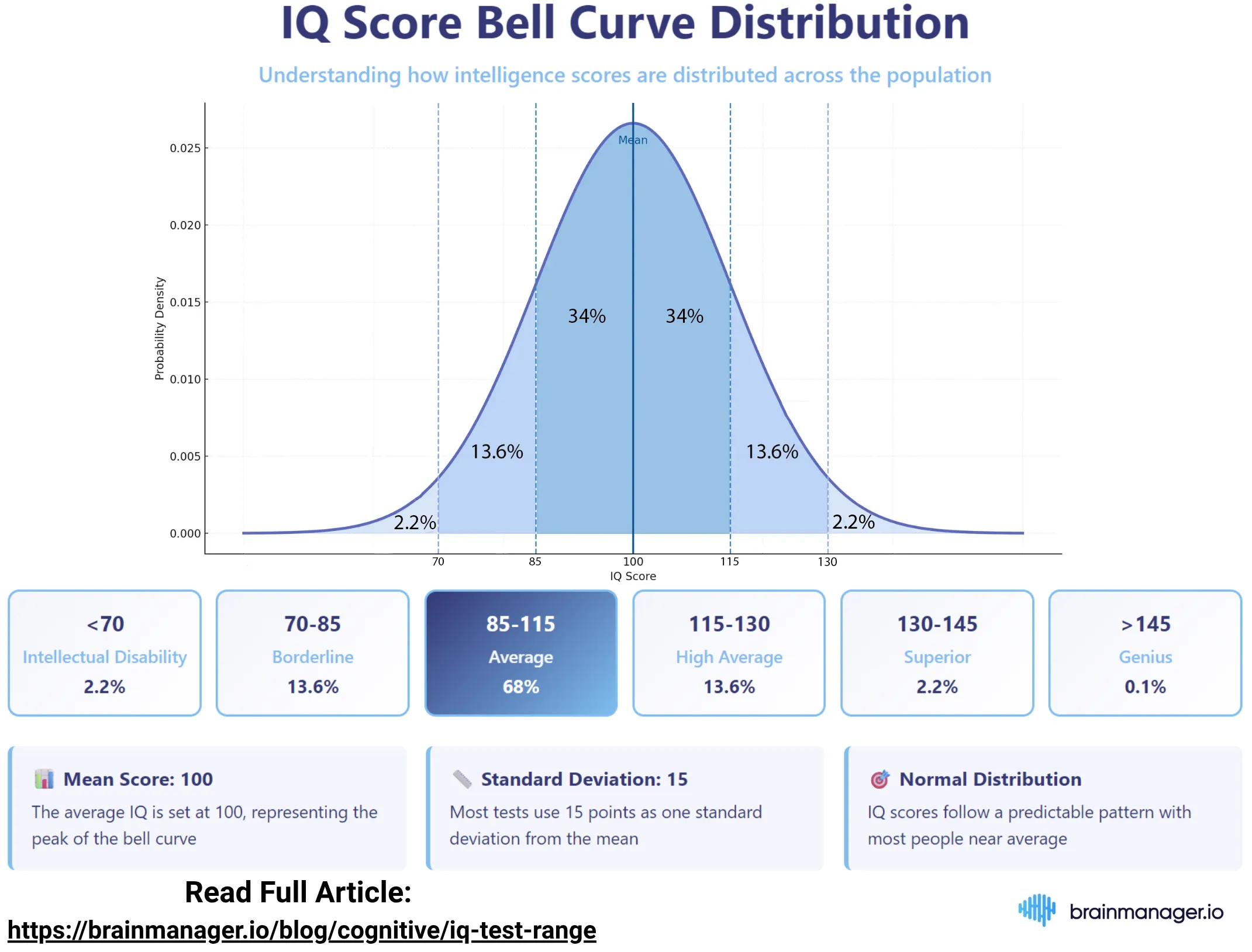What Is Considered a High IQ? What Does It Mean to Have a High IQ?
Discover what it truly means to have a high IQ beyond just the numbers. While a high IQ can indicate exceptional cognitive abilities and be considered good, there are also downsides to having high intelligence. This article explores the traits of individuals with high IQs and addresses common questions about high IQ scores. Dive in to understand how a high IQ intersects with other factors like grit, creativity, and practical skills to shape one's life outcomes.


Back
6 mins read
The scale of human intelligence has always been a fascinating subject. Long before the advent of IQ tests, numerous attempts were made to classify human intelligence, mainly through behavioral observation.
IQ testing has come a long way since then. Today, it's easy to find intelligence tests that can give you instant results to help you get in touch with your cognitive abilities.
You probably know a few entrepreneurs and innovators with a high IQ. This generalization may have led you to believe that successful people must have a high IQ. After all, we can't imagine our world without the mind-boggling ideas pioneered by people like Albert Einstein, Steven Hawking, Bill Gates, Nikola Tesla, Steve Jobs, and Elon Musk.
But did you know that "a high IQ" is not even the highest IQ score?
We will break down the IQ test, its measures, the IQ scale, and its interpretation to understand what a high IQ means. We'll also delve deep into how a high IQ score affects the general life of the individual, as well as how high intelligence is not always the same thing as having a high IQ score!
What Is a High IQ?
A high IQ score typically falls within the range of 120 to 129, which is considered "Superior." Scores of 130 and above are classified as "Very Superior" or "Gifted." These ranges indicate above-average cognitive abilities, with most research agreeing that an IQ of 130 or higher places an individual in the top 2% of the population.
When people talk about others having a "high IQ," they can mean different things depending on the context. Objectively, a high IQ typically refers to a specific range of scores on standardized intelligence tests, often indicating superior cognitive abilities in areas like problem-solving, logical reasoning, and analytical thinking.
High IQ Scores According to Different IQ Tests
Most IQ testing consists of different subsets that measure the various aspects of IQ, and these subset scores are combined to give the individual an IQ score. The scores are also sorted by chronological age, especially when determining entry into a school, university, or a high IQ society.
Technically speaking, anything above 100 is considered "higher than average," but when most people talk about high IQ, they refer to higher numbers. While most IQ tests are quite similar, they use different test scales, and therefore, the high IQ scores may vary. Here are the examples of what is considered a high IQ by different intelligence tests:
| IQ Test | High IQ Score | Notes |
|---|---|---|
| Stanford-Binet Intelligence Scales | 130+ | Standard deviation: 15; IQ ≥130 typically indicates giftedness or very superior intelligence. |
| Wechsler Adult Intelligence Scale (WAIS) | 130+ | Also uses SD of 15; high IQ defined as ≥130, same as Stanford-Binet. |
| Wechsler Intelligence Scale for Children (WISC) | 130+ | Child version of WAIS; scores of 130 and above are in the gifted range. |
| Cognitive Assessment System, 2nd Edition (CAS2) | 120+ | Standard score mean: 100; SD: 15; 120+ is considered above average to superior. |
| Differential Ability Scales (DAS) | 130+ | Designed for children; 130+ on General Conceptual Ability (GCA) scale indicates giftedness. |
| Kaufman Assessment Battery for Children (KABC) | 130+ | Uses Mental Processing Index; ≥130 reflects superior cognitive ability. |
| Cattell Culture Fair Intelligence Test (CFIT) | 130+ | Standard deviation: 16; 130+ typically represents high non-verbal intelligence. |
| Raven's Standard Progressive Matrices (RPM) | Top 5% (approx. 125–130+) | Score reported as percentiles; top 5% usually equates to ~125–130 IQ range. |
Remember that IQ tests vary based on several factors, including the actual test and geographical factors. That said, there is a consensus that the average score is 100 (standard deviation of 15). Most of the population scores lie between 85 and 115 (over 65%), with only a tiny group scoring a High IQ of 130 and above, which makes them some of the most intelligent people on the planet.
Theoretically, there is no upper limit to IQ scores. While 200 is commonly regarded as the peak score, some individuals have reportedly exceeded this number. These classifications provide a general framework for understanding IQ scores. However, it's important to remember that intelligence is multifaceted and can't be fully captured by a number.
Signs of High IQ
People with a high IQ are more brilliant than the general population. But can you point them out without knowing their IQ score?
Here are the common signs of high intelligence that they all share:
1. Adaptability
IQ reflects an individual's ability to process new information, recognize patterns, and adjust their thinking or behavior in response to changing environments, making adaptability a key indicator of cognitive flexibility and problem-solving capacity.
2. Creativity
People with high IQs like thinking out of the box and developing original ideas. They want to challenge the status quo and offer unique solutions that will solve societal problems.
3. Curiosity
Curiosity is one of the hallmarks of a high IQ. Their hunger for exploration drives them to seek more information, ask insightful questions, and form beneficial partnerships that allow them to expand their horizons and increase their potential for personal development.
4. Weird & Even Dark Sense of Humor
People with higher IQs can comprehend more complex jokes, which may make others perceive their humor as weird. Not only that, studies have found that higher intelligence is often associated with a dark sense of humour, which can be explained by their ability to understand abstract, layered, and often taboo concepts without becoming emotionally overwhelmed.
5. Super-Attentiveness
Unsurprisingly, these individuals have an exceptional ability to observe minute details and absorb a lot of information. This super ability fuels their innate need to increase their knowledge base and problem-solving abilities, and gain a faster and better understanding of the world than most people.
6. Better Physical and Mental Health
A recent study suggests that higher intelligence correlates with better physical and mental health outcomes. Individuals with higher intellectual abilities are 30% less likely to suffer depression, have a lower risk of cancer, and live longer lives. These outcomes are likely because they tend to have good jobs that command high salaries, live in better areas, and have good healthcare plans.
Another explanation is that their quest for knowledge and problem-solving skills helps them choose healthier lifestyles and seek treatment for prevailing symptoms faster.
7. Modesty
Despite their enviable IQ, most avoid showing off their knowledge or exhibiting arrogance. They may have the best access to education. Still, they understand that IQ does not equate to success and look forward to constructive debates and the contributions of others. Ultimately, like everyone else, they long to create genuine connections with others on equal ground.
High Intelligence vs. High IQ Score: What's the Difference?
High intelligence and a high IQ score are not always synonymous. While a high IQ score typically reflects strong cognitive abilities as measured by standardized tests, high intelligence can encompass a broader range of skills, including practical intelligence, street smarts, and creative intelligence.
Practical intelligence, often called "street smarts," involves solving real-world problems and navigating everyday challenges effectively. Traditional IQ tests do not always capture this form of intelligence but it's crucial for success in daily life.
Creative intelligence, on the other hand, refers to thinking outside the box, generating innovative ideas, and approaching problems from unique perspectives. This type of intelligence can manifest in artistic endeavors, scientific innovation, and even entrepreneurial ventures. Individuals with high creative intelligence may excel in areas that require novel thinking and originality, which might not be reflected in their IQ scores.
Additionally, emotional intelligence, which includes empathy, self-awareness, and interpersonal skills, plays a significant role in personal and professional success. People with high emotional intelligence manage their emotions well, build strong relationships, and navigate social complexities effectively.
In summary, while a high IQ score is a measurable indicator of certain cognitive abilities, high intelligence is a multifaceted concept that includes practical, creative, and emotional components. These diverse forms of intelligence contribute to a person's overall ability to succeed and thrive in various aspects of life.
You May Also Like: Can I Have a High IQ and Make Dumb Decisions?
High IQ, It's What You Do With Your Gifts!
Knowing your IQ score is a good way to learn about your cognitive abilities, maximize them, and improve life outcomes. However, your success is also based on many more factors than just IQ. These include grit, hard work, and dedication.
People with average IQs can achieve great things through perseverance, creativity, and emotional intelligence. Conversely, individuals with high IQs may not reach their full potential without the motivation and resilience to overcome challenges.
Ultimately, success combines intellectual ability, personality, and personal attributes like determination, curiosity, and adaptability. Whether you have a high IQ or an average one, embracing these qualities will help you make the most of your unique gifts and navigate life's complexities effectively.
Recommended Reading


Return to Blog







